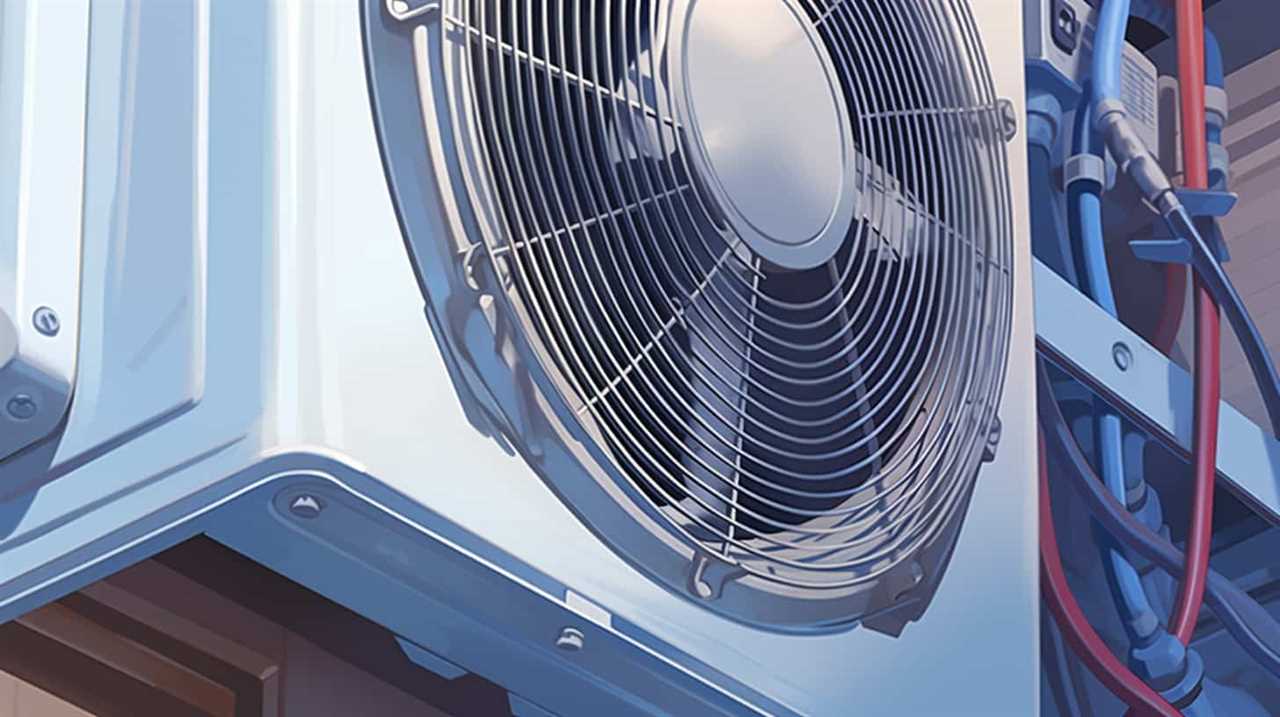Did you know that regularly maintaining your heat pump can significantly extend its lifespan? In this article, we will explore the importance of taking care of your unit and provide helpful tips on how to improve the performance of your heat pump.
From understanding its components to cleaning air filters and checking refrigerant levels, we’ll cover everything you need to know to keep your heat pump running smoothly.
So, let’s dive in and learn how to make your heat pump last longer!
Key Takeaways
- Regular maintenance is essential for extending the lifespan of a heat pump.
- Professional maintenance ensures peak efficiency and reduces energy consumption.
- Regular maintenance prevents unexpected breakdowns and costly repairs.
- Finding a reliable technician is important for quality maintenance and service.
The Importance of Regular Maintenance
Regular maintenance is crucial for maximizing the lifespan of our heat pump. By following a few simple heat pump maintenance tips, we can ensure that our system operates at peak efficiency and lasts for years to come.
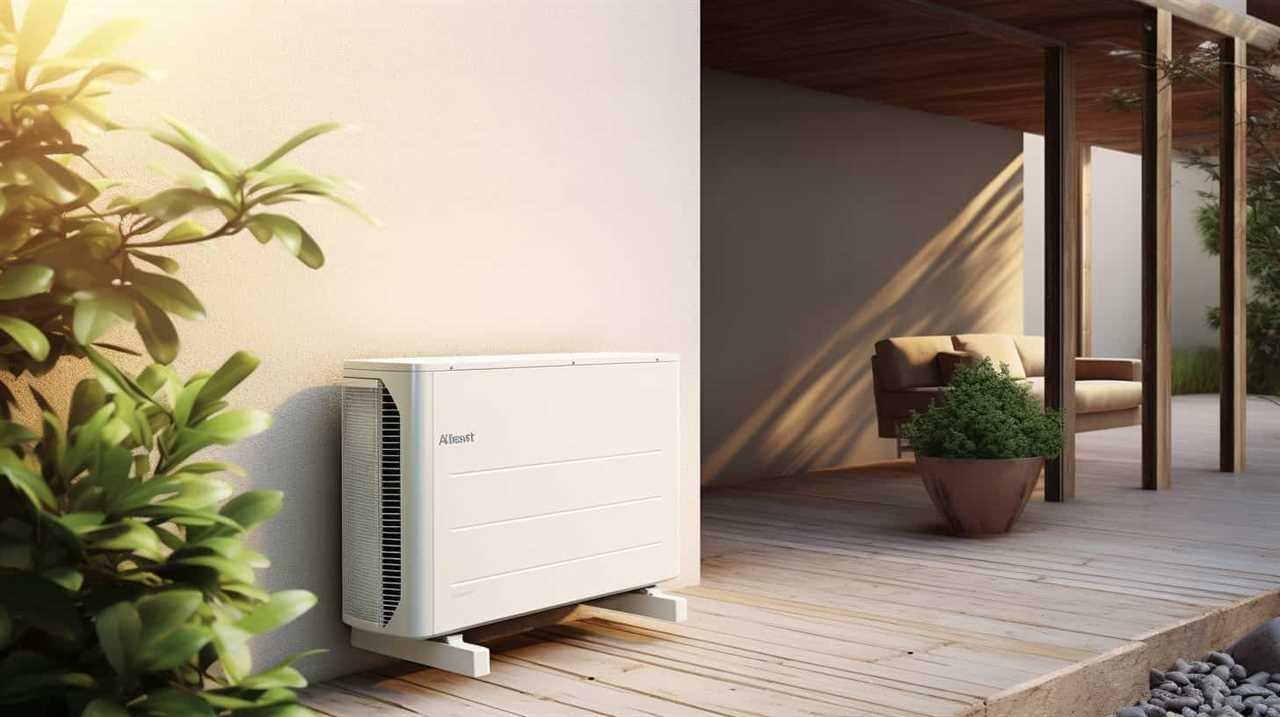
One of the key benefits of regular maintenance is improved energy efficiency. When our heat pump is properly maintained, it can provide effective heating and cooling without consuming excessive energy. This not only helps to reduce our utility bills but also minimizes our impact on the environment.
Regular maintenance also helps to prevent unexpected breakdowns and costly repairs. By addressing minor issues before they escalate, we can avoid major malfunctions and extend the lifespan of our heat pump.
Therefore, investing time and effort into regular maintenance is essential for the longevity and optimal performance of our heat pump.
Understanding Your Heat Pump’s Components
Let’s take a closer look at the vital components of your heat pump and how understanding them can help maximize its lifespan.

By familiarizing ourselves with these key parts, we can better appreciate the importance of regular maintenance in ensuring the longevity of our heat pump.
Additionally, we’ll explore some troubleshooting tips for each component to help address any potential issues that may arise.
Vital Heat Pump Parts
One of the most important components of our heat pump is the compressor, which is responsible for circulating the refrigerant and facilitating the heat transfer process. Understanding the vital heat pump parts is crucial for ensuring efficient operation and preventing common heat pump problems.
Here are three key components to be aware of:

-
Evaporator Coil: This coil absorbs heat from the surrounding air or ground, allowing the refrigerant to evaporate and carry the heat to the compressor.
-
Condenser Coil: The condenser coil releases heat into the surrounding environment by condensing the refrigerant, allowing it to return to its liquid state.
-
Expansion Valve: This valve controls the flow of refrigerant, regulating its pressure and temperature as it moves between the evaporator and condenser coils.
By maintaining and regularly inspecting these vital components, we can ensure that our heat pump operates efficiently and experiences fewer issues.

Now, let’s explore how proper maintenance can further extend the lifespan of our heat pump.
Maintenance for Longevity
To ensure our heat pump operates at its best and lasts as long as possible, we need to have a clear understanding of its components. Proper maintenance is crucial for the longevity of your heat pump. Here are some maintenance tips to keep in mind:
-
Regularly clean or replace air filters: Clogged filters can restrict airflow and reduce the heat pump’s efficiency. Clean or replace them every 1-3 months.
-
Clear debris around the outdoor unit: Leaves, dirt, and other debris can obstruct airflow and cause the system to work harder. Keep the area around the outdoor unit clean and clear.
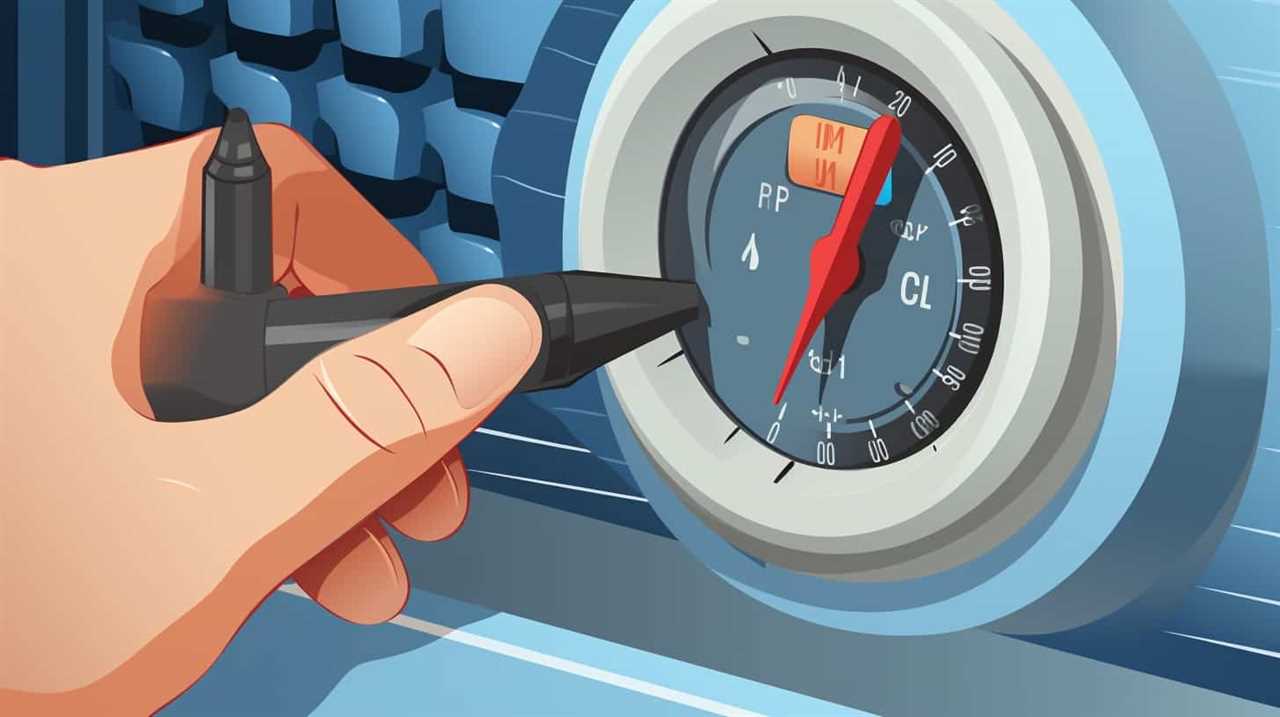
-
Schedule professional maintenance: Regular tune-ups by a qualified technician can identify and address any potential issues before they become major problems.
Common problems to watch out for include refrigerant leaks, faulty thermostats, and electrical issues. By following these maintenance tips and addressing common problems promptly, you can maximize the lifespan of your heat pump and ensure optimal performance.
Component Troubleshooting Tips
We will now explore five component troubleshooting tips to help you better understand your heat pump’s components and address any potential issues:
-
Check the thermostat settings: Ensure that the thermostat is set to the correct temperature and mode. Incorrect settings can lead to inefficient operation and discomfort.

-
Inspect the air filters: Dirty or clogged air filters can restrict airflow, reducing the heat pump’s efficiency. Regularly clean or replace the filters to maintain optimal performance.
-
Examine the outdoor unit: Inspect the outdoor unit for debris, such as leaves and dirt, that can obstruct airflow. Clear any obstructions to prevent potential damage and improve efficiency.
By following these troubleshooting techniques, you can identify and resolve common problems with your heat pump’s components.
Regular maintenance and proper care will help maximize your heat pump’s lifespan and ensure its efficient operation.
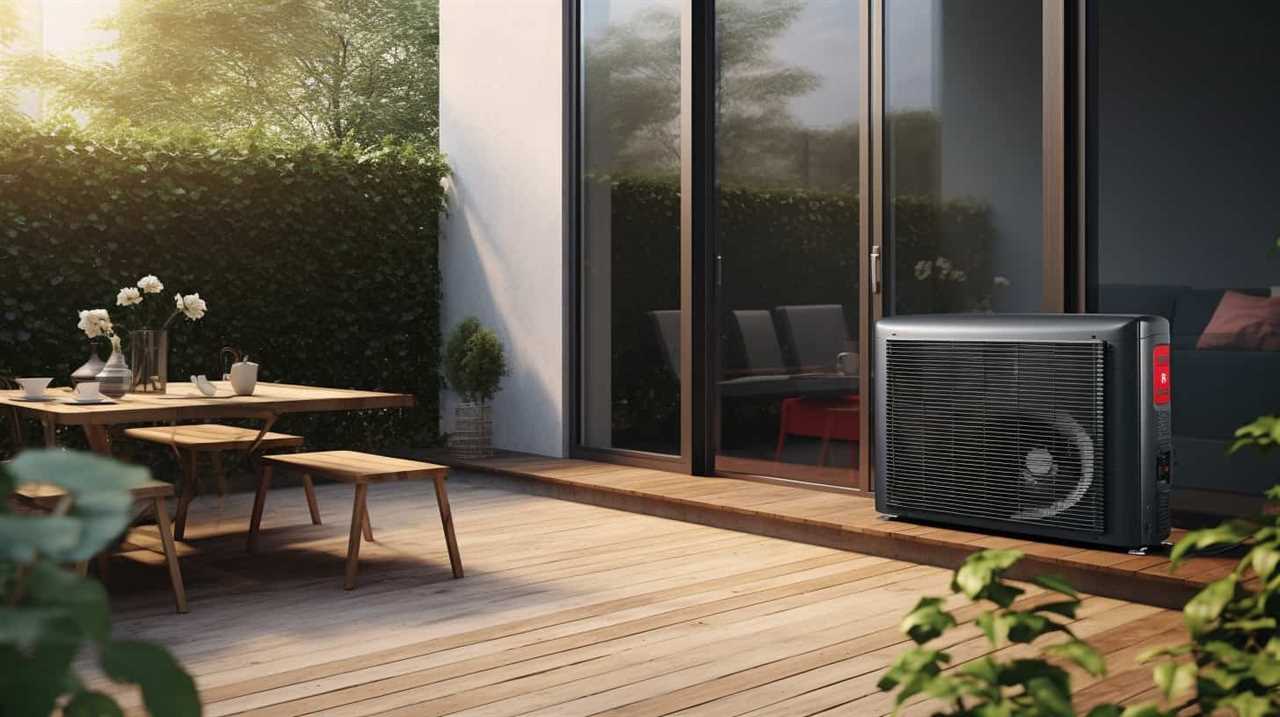
Cleaning and Changing Air Filters
Regularly clean and change the air filters in your heat pump to ensure optimal performance and extend its lifespan. The air filters in your heat pump play a vital role in maintaining the quality of the air in your home. Over time, they can become clogged with dust, dirt, and other particles, reducing the efficiency of your heat pump and potentially causing damage. To avoid these issues, it is important to perform air filter maintenance regularly. This involves cleaning or replacing the filters according to the manufacturer’s recommendations.
To help you understand the importance of air filter maintenance, here is a table showcasing the benefits of cleaning and changing air filters:
| Benefits of Air Filter Maintenance | ||
|---|---|---|
| 1. Improved Indoor Air Quality | 2. Enhanced Energy Efficiency | 3. Extended Heat Pump Lifespan |
| 4. Reduced Allergens and Pollutants | 5. Consistent Heat Pump Performance | 6. Cost Savings on Energy Bills |
Taking the time to clean or replace your air filters will not only ensure that your heat pump operates efficiently but also provides you with cleaner and healthier air. Regular maintenance will save you money in the long run and keep your heat pump running smoothly for years to come.
Checking and Adjusting Refrigerant Levels
When it comes to maximizing the lifespan of your heat pump, checking and adjusting refrigerant levels is of utmost importance.
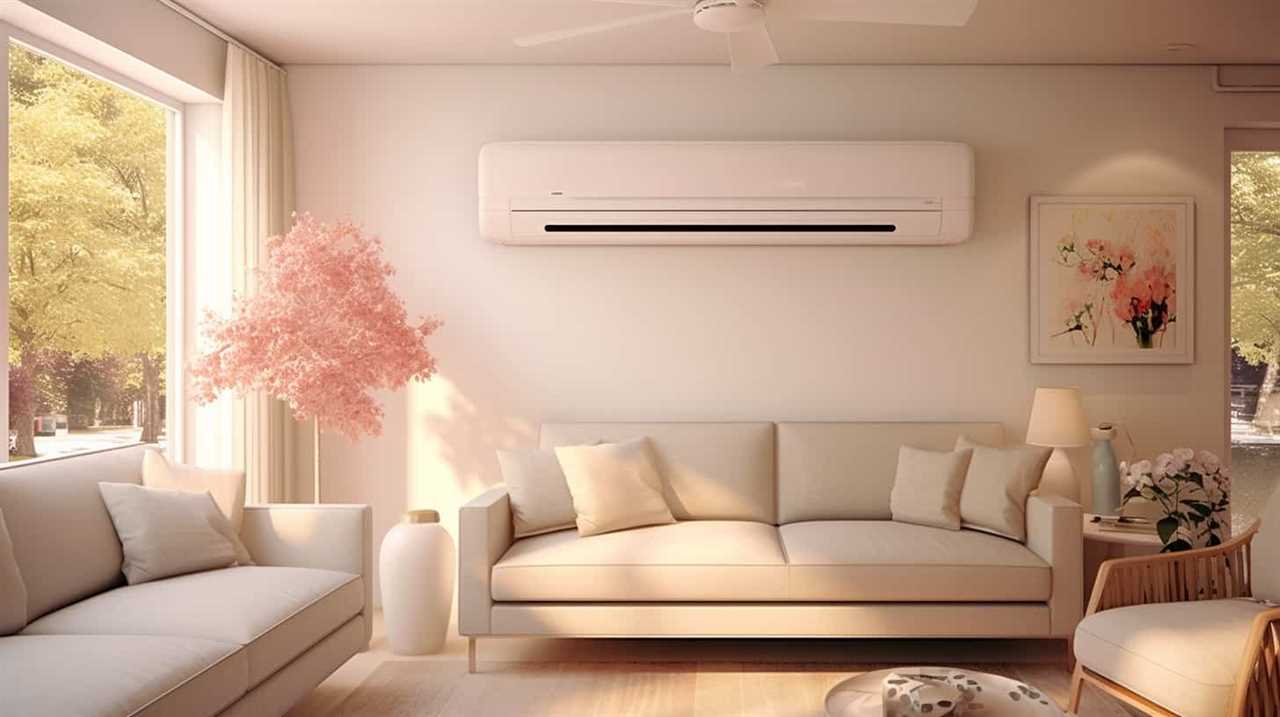
Proper maintenance techniques for this crucial component can significantly extend the lifespan of your heat pump.
Importance of Refrigerant Levels
To ensure optimal performance, it’s crucial to regularly check and adjust the refrigerant levels in your heat pump. Proper refrigerant levels are essential for efficient heat transfer and overall system functionality. Here are three key reasons why monitoring and maintaining the refrigerant levels in your heat pump is of utmost importance:
-
Preventing refrigerant leaks: Low refrigerant levels can lead to leaks in the system, which can cause reduced cooling or heating capacity. Regularly checking and adjusting the refrigerant levels helps identify and address potential leaks before they become major issues.
-
Optimizing energy efficiency: When the refrigerant levels are too low or too high, the heat pump’s energy efficiency can be compromised. By maintaining the correct refrigerant levels, you ensure that your heat pump operates at maximum efficiency, saving energy and reducing utility costs.
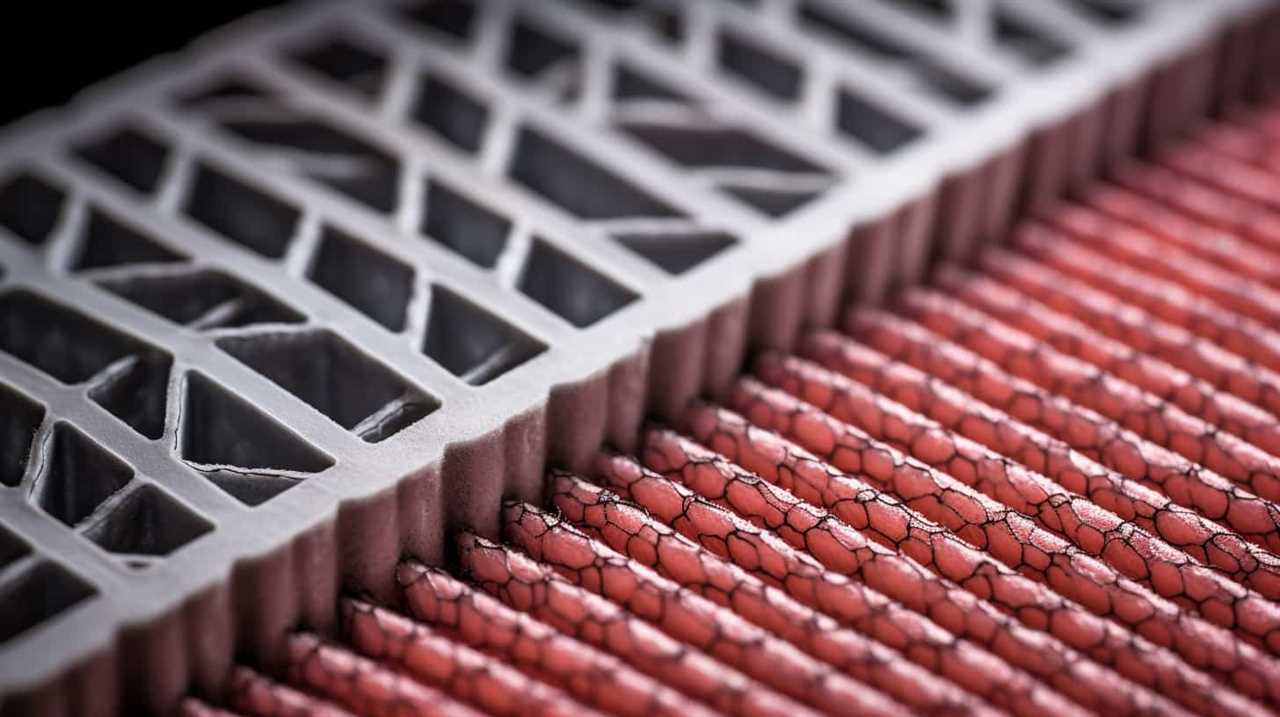
-
Ensuring proper refrigerant evacuation: During maintenance or repairs, it may be necessary to evacuate and recharge the refrigerant. Monitoring the refrigerant levels allows you to determine when this process is required, ensuring that the heat pump operates at its best.
Proper Maintenance Techniques
Our team ensures that we regularly check and adjust the refrigerant levels in your heat pump to maximize its lifespan and performance. Proper maintenance of the refrigerant levels is crucial for the efficient operation of your heat pump. Insufficient or excessive refrigerant can lead to decreased performance, increased energy consumption, and even damage to the compressor.
To effectively check and adjust refrigerant levels, our technicians utilize specialized heat pump maintenance tools such as gauges, thermometers, and pressure sensors. These tools allow us to measure the pressure and temperature of the refrigerant, ensuring that it is within the manufacturer’s recommended range.
Common maintenance mistakes include overcharging or undercharging the refrigerant. Overcharging can lead to high pressure in the system, causing the compressor to work harder and potentially fail. Undercharging, on the other hand, can result in low pressure, reduced cooling capacity, and increased energy consumption. Our team is trained to avoid these mistakes and maintain optimal refrigerant levels for your heat pump’s longevity and performance.
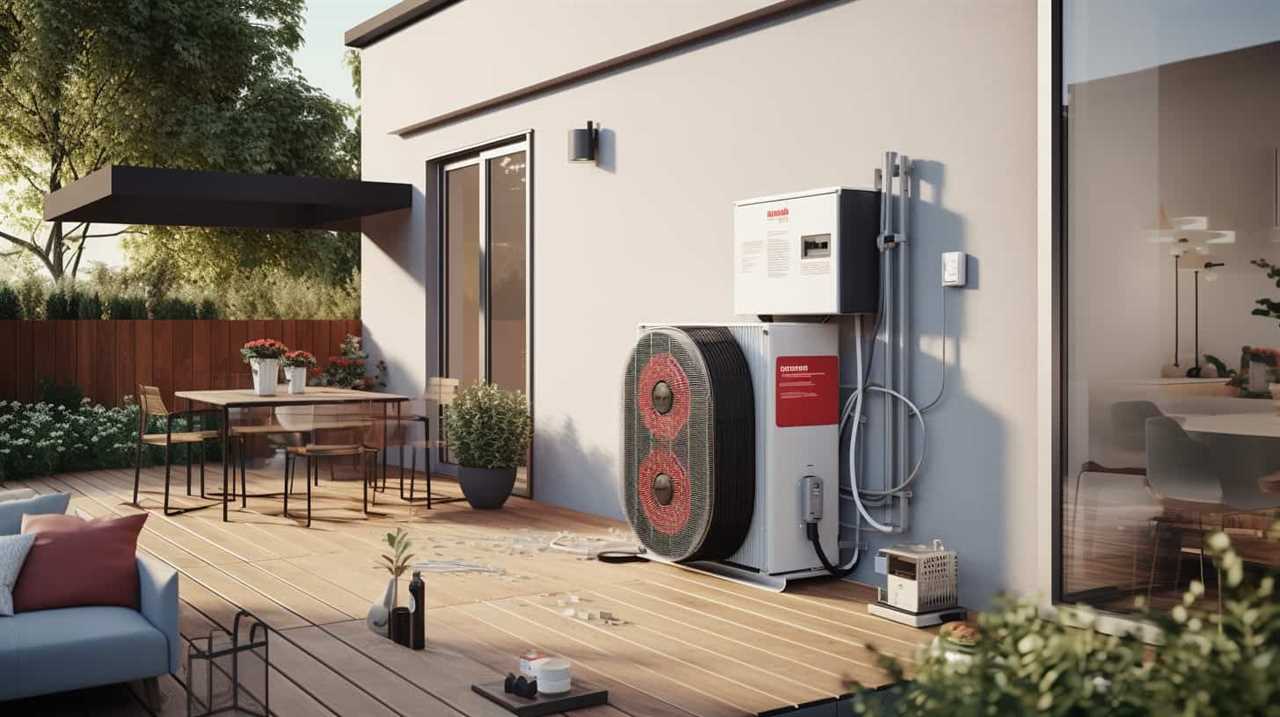
| Common Maintenance Mistakes | Heat Pump Maintenance Tools |
|---|---|
| Overcharging the refrigerant | Gauges |
| Undercharging the refrigerant | Thermometers |
| Pressure sensors |
Extending Heat Pump Lifespan
We carefully monitor and adjust the refrigerant levels in your heat pump to extend its lifespan and optimize its performance. Maintaining proper refrigerant levels is crucial for the efficient operation of your heat pump.
Here are three essential heat pump maintenance tips for maximizing efficiency:
-
Regular inspections: Our team conducts routine inspections to check the refrigerant levels in your heat pump. This ensures that the system is operating at the optimal level and prevents any potential issues caused by low refrigerant.
-
Leak detection: We use advanced techniques to detect any refrigerant leaks in your heat pump system. Identifying and repairing leaks promptly not only helps in extending the lifespan of the pump but also prevents energy wastage and reduces environmental impact.

-
Professional adjustment: If the refrigerant levels are found to be low, our trained technicians will add the necessary amount to bring them back to the recommended level. This adjustment is critical for maintaining the efficiency and longevity of your heat pump.
Lubricating Moving Parts for Optimal Performance
Regularly lubricating the heat pump’s moving parts ensures optimal performance and extends its lifespan. Proper lubrication techniques are essential for maintaining the efficiency of your heat pump. By lubricating the bearings, shafts, and other moving components, you can reduce friction and wear, allowing the heat pump to operate smoothly and quietly.
Regular lubrication also helps prevent overheating and extends the life of the heat pump by reducing the strain on its parts. Additionally, lubrication helps to minimize energy consumption, as a well-lubricated heat pump requires less power to operate.
It’s recommended to consult the manufacturer’s guidelines for the appropriate lubrication schedule and type of lubricant to use. By incorporating regular lubrication into your heat pump maintenance routine, you can enjoy the benefits of optimal performance and an extended lifespan.
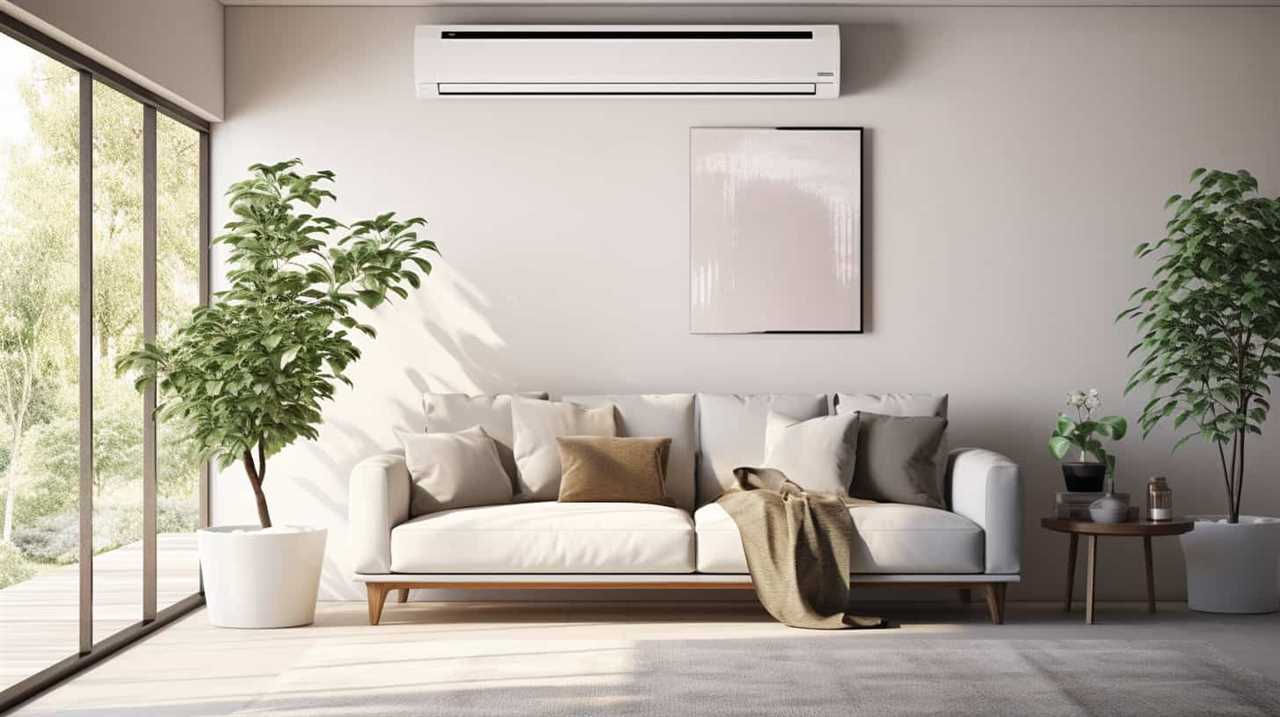
Inspecting and Cleaning Coils and Fins
To ensure optimal performance and longevity, we must regularly inspect and clean the coils and fins of our heat pump. The coils and fins play a crucial role in the heat transfer process of the unit.
Here are three key steps to effectively inspect and clean them:
-
Inspecting Coil Condition: Check for any signs of dirt, debris, or damage on the coils. Over time, dirt and debris can accumulate on the coils, reducing their efficiency. Additionally, inspect for any signs of coil corrosion or leaks, as these can lead to refrigerant leaks and decreased performance.
-
Troubleshooting Coil Issues: If you notice any issues with the coils, such as poor heat transfer or uneven cooling, it’s important to troubleshoot the problem. This may involve checking for blockages, ensuring proper airflow, or adjusting refrigerant levels.

-
Cleaning Coils and Fins: Regularly clean the coils and fins to remove dirt, dust, and debris. Use a soft brush or vacuum cleaner to gently remove any buildup. Avoid using abrasive materials or excessive force, as this can damage the delicate fins.
By regularly inspecting and cleaning the coils and fins, we can ensure efficient heat transfer and prevent potential issues. This maintenance step is essential for maximizing the lifespan of our heat pump.
Now, let’s move on to the next section, which focuses on scheduling professional maintenance and tune-ups.
Scheduling Professional Maintenance and Tune-ups
To ensure optimal performance and extend the lifespan of our heat pump, it’s recommended that we schedule professional maintenance and tune-ups at least once a year. Scheduling regular maintenance offers several benefits.

Firstly, it helps identify and address any potential issues before they escalate into costly repairs. Additionally, maintenance ensures that our heat pump operates efficiently, resulting in lower energy bills. A well-maintained heat pump also provides better indoor air quality, as it effectively filters out pollutants and allergens.
When it comes to finding a reliable technician, it’s important to consider their experience, qualifications, and reputation. Look for technicians who are certified and have a good track record. Reading customer reviews and seeking recommendations can also help in finding a trustworthy professional.
Regularly scheduling professional maintenance and tune-ups is crucial for maximizing the lifespan of our heat pump and enjoying its benefits.
Frequently Asked Questions
Can I Perform Maintenance on My Heat Pump Myself, or Should I Always Hire a Professional?
We can perform DIY heat pump maintenance, but there are pros and cons. It’s cost-effective, but we may lack expertise or void warranties. Professional maintenance ensures proper care and extends the lifespan of our heat pump.

How Often Should I Have My Heat Pump Professionally Maintained?
To maximize your heat pump’s lifespan, it is important to have it professionally maintained at regular intervals. Following a heat pump maintenance checklist ensures optimal performance and efficiency, extending the life of your system.
What Are the Signs That My Heat Pump May Need Maintenance or Repairs?
Regular maintenance is important for maximizing your heat pump’s lifespan. Signs of heat pump issues include reduced airflow, strange noises, and inconsistent heating or cooling. Professional repairs may be needed to address these issues.
Are There Any Specific Maintenance Tasks I Should Be Doing During the Winter Months?
During the winter months, we should perform specific maintenance tasks to ensure optimal performance of our heat pump. These tasks include cleaning or replacing filters, checking and adjusting refrigerant levels, and inspecting outdoor units for debris and damage.
How Can I Extend the Lifespan of My Heat Pump Beyond the Average Lifespan?
To extend the lifespan of our heat pump beyond the average, we can implement regular maintenance tasks. These include cleaning or replacing air filters, inspecting and cleaning coils, and ensuring proper refrigerant levels.
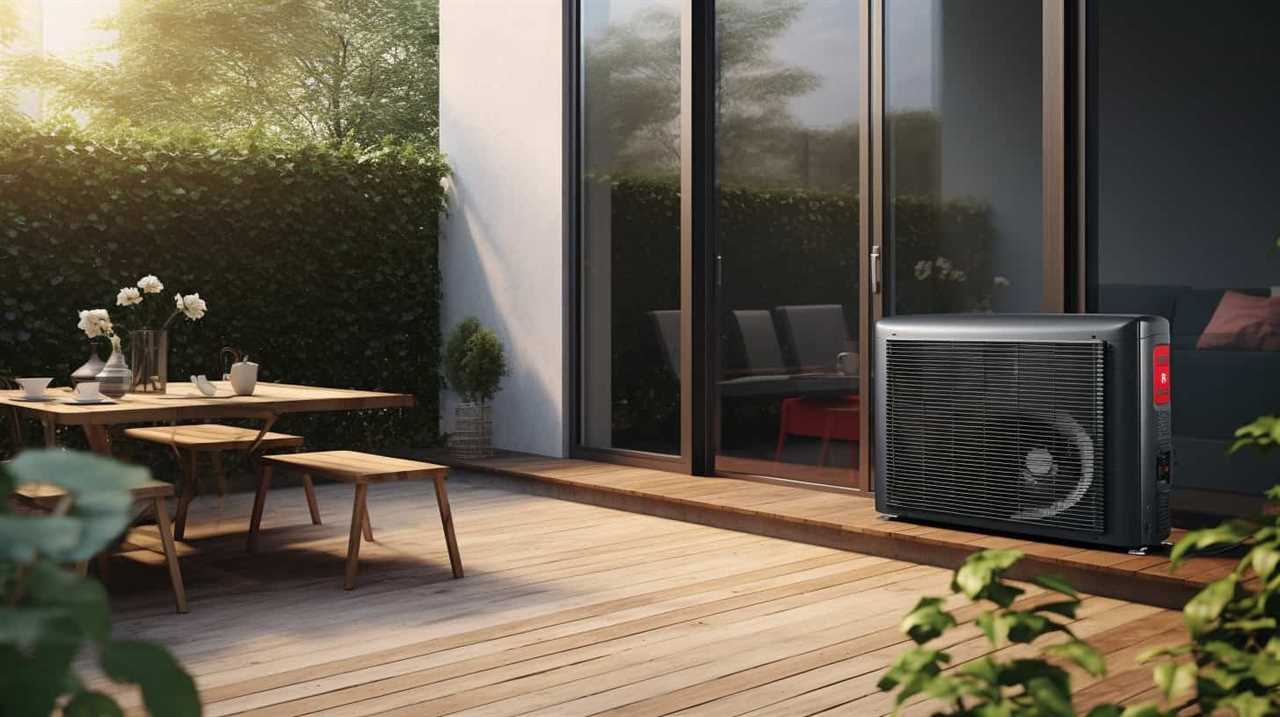
Conclusion
In conclusion, by performing regular maintenance on your heat pump, you can ensure its longevity and efficiency.
Just like taking care of your own body, maintaining your heat pump will keep it running smoothly and effectively.
Imagine the peace of mind knowing that your heat pump is working at its best, providing you with comfort and warmth.
Don’t neglect the maintenance, and enjoy the benefits of a well-maintained heat pump for years to come.

